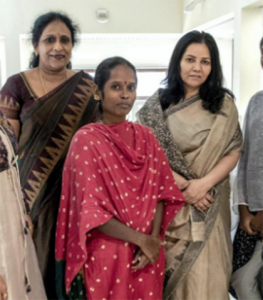Women absent in migration policy thinking – report
Women are an increasingly participating in labour migration and a new report outlines ways in which they can take control of their lives.
Focusing particularly on Indian women labour migrants, researchers S Irudaya Rajan and N Neetha have identified several specifically female forms of migration and female-specific economic niches.
 Their report, titled ‘Migration, Gender and Care Economy’, says these niche areas include the commercialised migration of domestic workers, also called “the maid trade,” the migration and trafficking of women in the sex industry, the organised migration of women for marriage called the “mail-order brides,” and migration for the care industry,
Their report, titled ‘Migration, Gender and Care Economy’, says these niche areas include the commercialised migration of domestic workers, also called “the maid trade,” the migration and trafficking of women in the sex industry, the organised migration of women for marriage called the “mail-order brides,” and migration for the care industry,
The researchers say the landscape of female migration has changed over time from migration due to marriage to migration for work, especially in urban areas
They say migration may actually make some women worse-off by forcing them to live in unhealthy places and environments without basic facilities, such as water and sanitation, while continuing to keep them at the mercy of vulnerable jobs.
The report includes details of a study conducted in the United Arab Emirates, attempts to understand why women are increasingly endeavouring to migrate and what it spells in terms of newer possibilities with respect to freedom and accessibility.
The study documents the multiple negotiations that women migrants make in the international labour market, how their identities are constructed by the interplay of existing hierarchies and social categories and more importantly how public spaces are utilised by the female migrant workers, helping them to develop informal networks and giving them a sense of anonymity.
The report also highlights the pain and feelings of being rootless some women migrants feel after migrating with their husbands.
The section is based on an ethnographic survey in Canada, which explores the experiences of Indian Hindu women face in having to balance the two opposing worlds of their native culture, which helps them maintain their identity in the foreign land, and the modern values of the their new homes.
The report also addresses an issue of how outmigration by younger people sees a lonely elderly population left behind and often suffering health issues as a result.
“With women also migrating as primary migrants and working spouses, the role of caregiver in the family became vacant requiring a rearrangement of extra familial care service for the elderly staying behind,” the report says.
“In the care hierarchy, care responsibility and care provisioning are biasedly distributed based on gender, caste and class with lower-caste women being increasingly hired for elderly care provisioning in houses of upper caste and upper-class transnational migrants,” it says.
The report argues the migration policies of host states are often restrictive for women, exploitative, paternalistic and encourage the development of an informal, even more exploitative migration channel.
The researchers have drawn on observations from India and Saudi Arabia and recommend the involvement of non-state actors in the development of migration policies to improve outcomes for women.












